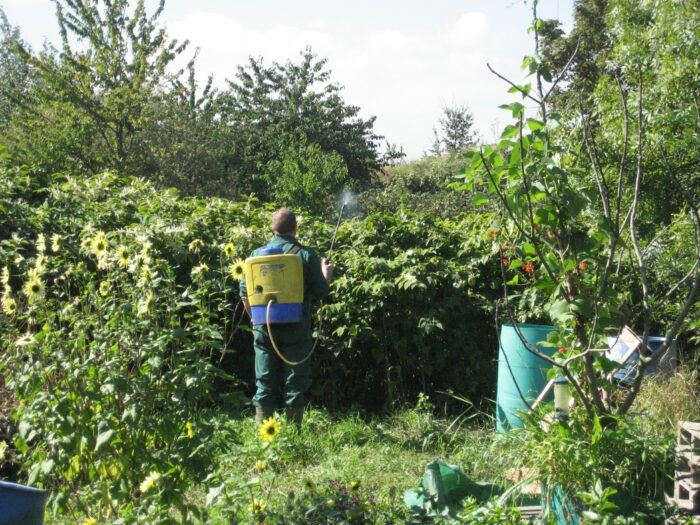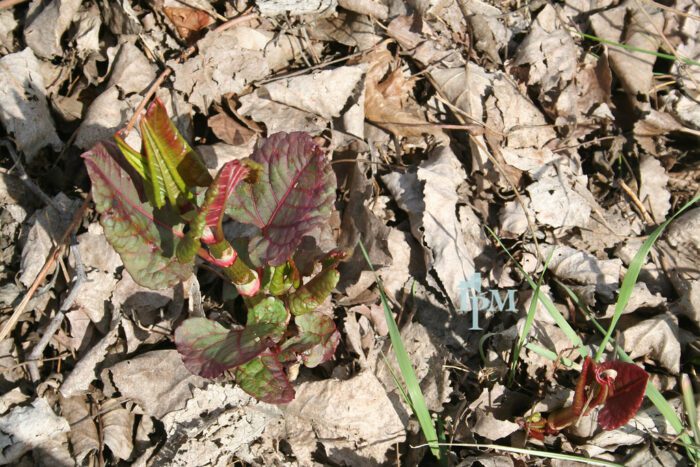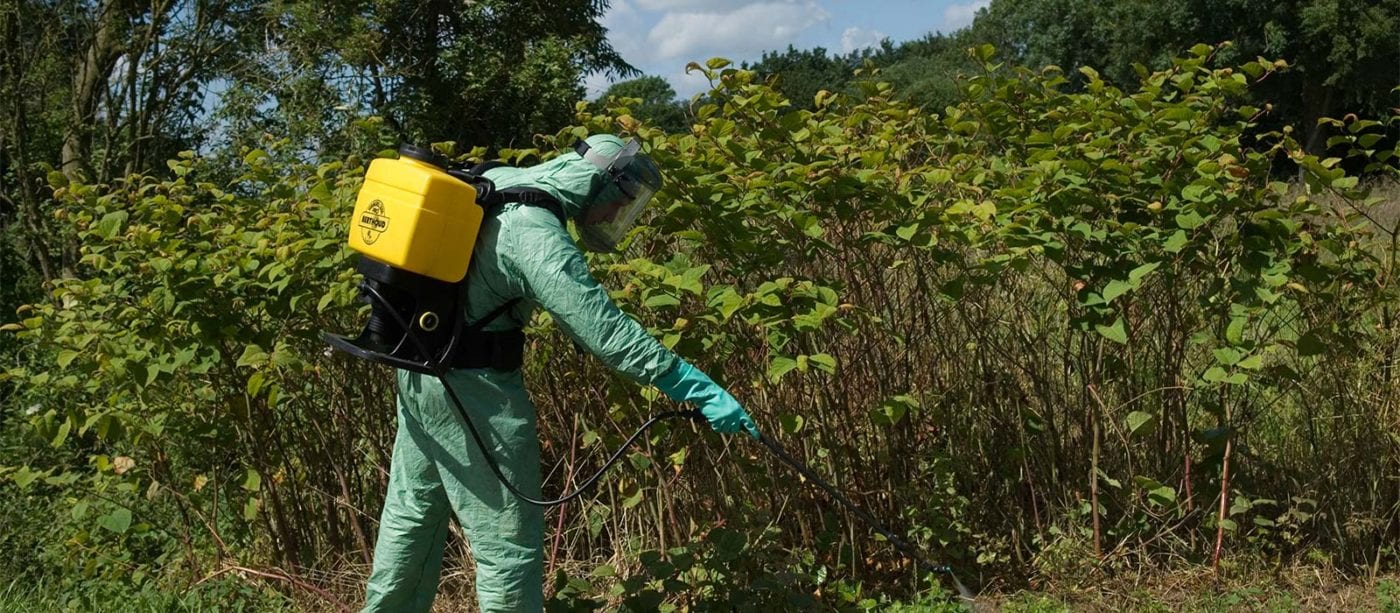Removal of Japanese Knotweed – How to Get Rid of It
No matter the size of your infestation, Japanese knotweed removal can take years [1]. Japanese knotweed cannot be eradicated by herbicide treatment alone. Getting rid of Japanese knotweed requires physically removing the plant (including its rhizomes) from your premises. Weed killing herbicide treatment is only able to control the Japanese Knotweed infestation. Cutting corners at any point in the Japanese Knotweed eradication process could lead to a never-ending battle or, worse still, a hefty fine.
We can answer your Japanese knotweed questions!
Talk To UsContents
How do you kill or treat Japanese Knotweed?
Although there is no quick fix to getting rid of Japanese knotweed infestations, below we have produced a list of everything you need to do to permanently get rid of japanese knotweed from your property yourself.
- Identify the Japanese Knotweed as soon as possible. Many plants are mistaken for Japanese knotweed such as shrubs, broadleaved docks and bindweed. It’s imperrative that you correctly identify whether you have japanese knotweed before continuing with the eradication process.
- Remove the knotweed canes by cutting off the canes as close to the ground as possible.
- Equip your professional japanese knotweed removal safety gloves, mask and body suit. This ensures you don’t accidentally spread the plant rhizomes outside of the infestation you are treating while also providing you with safety.
- Apply japanese knotweed glyphosate concentration. Known as one of the best weed killers for japanese knotweed, glyphosate is proven at killing knotweed.
- Allow the japanese knotweed glyphosate concentration to sit for at least 7 days. Ensure you only spray the japanese knotweed, as this solution often destroys all vegitation that it comes into contact with.
- Pull the Japanese knotweed roots. Ensuring all roots have been pulled from the ground.
- Mow the plants and surrounding vegetation on a weekly basis. Ensure that any re-growth or remaining shoots or roots are cut as soon as they are spotted.
- Dispose of all japanese knotweed waste. This must be done by transferring it to a knotweed permitted disposal facility.
- Reapply the Glyphosate-based knotweed killer. While wearing japanese knotweed safety clothing, apply more glyphosate. Professionals recommend repeating these steps at least twice per year.
- Consult a professional. Over the years, japanese knotweed has proven to be immensely difficult to remove without professional assistance. Therefore, we recommend seeking help from a PCA-accredited firm that can offer a guarantee which will be trusted by mortgage lenders and potential buyers.

What is the best Japanese Knotweed herbicide killer?
Roundup Tree Stump, Gallup, Landmaster, Pondmaster, Ranger, Rodeo, Touchdown, Garzon Pro and Vitax are proven to be the best weed killing herbicides to kill Japanese Knotweed. Round Tree Stump will kill Japanese Knotweed most effectively, as it is recommended by the RHS [5] and includes specific instructions on how to use it for killing Japanese knotweed. The herbicide is applied to either the cut canes or is painted using a foliar spray. Other herbicides that are reported as killing Japanese knotweed are SBM Job done Tough Weedkiller and Roundup Ultra.
Whenever using a herbicidal weed killer it’s important to follow all instructions to the letter. Non-selective weed-killers have the capacity to damage any biological matter they touch, following the instructions will ensure you make the most of your investment whilst minimising any potential damage to yourself or the environment.
How to kill Japanese Knotweed using herbicides
You’ll need:
- A herbicide treatment such as Roundup ProVantage 480, Rosate Glyphosate TF and Gallup Glyphosate Home and Garden Weed Killer
- Protective clothing including gloves and mask
- If using a foliar sprayer, isolate the area and remove any plants or vegetation that you do not want to be harmed by the herbicide treatment.
- Preferably before the height of summer, use either a foliar sprayer or preferably a specialised herbicide injection gun to treat every plant within your chosen area.
- The glyphosate treatment will be transferred into the knotweed’s rhizome system and the plant will slowly die back over the next year.
- Return in subsequent years to check on any surviving growth and treat as before.
What is the best way to kill Japanese Knotweed?
The best way to kill Japanese knotweed is with a professional-grade glyphosate treatment plan [3] administered by a PCA-accredited firm that can offer a guarantee which will be trusted by mortgage lenders and potential buyers. Professional firms have access to stronger chemicals than the general public, which means they get the job done quicker and should be able to offer you an insurance backed certificate. This certificate will prove that you’re actively working to deal with the infestation and will cover you for a stated number of years.
When writing about the Swansea University Japanese Knotweed Trials [4], Nic Seal said:
“It is possible to completely kill knotweed using herbicide, if applied correctly. The time it takes will depend on site conditions and in particular the maturity of the plant and the size of its underground rhizome system. Smaller infestations can be killed in two years, larger ones may take three or more years.”
How can you get rid of Japanese knotweed organically?
Get rid of Japanese knotweed organically by either digging it up, burning it or smothering it with a tarpaulin. All these methods do not require the use of any herbicides that could potentially damage nearby plants, however, they each have their drawbacks.
Digging up a Japanese knotweed infestation is organic, but is by far the most costly method. If you choose to burn the Japanese knotweed you run the risk of not burning every last fragment and risk a resurgence. Meanwhile, smothering Japanese knotweed can take much longer to prove effective.
Killing Japanese Knotweed with vinegar
There is no scientifically backed evidence to suggest that vinegar will kill Japanese knotweed. Although there has been some amateur research [6] conducted on the topic, the use of vinegar to kill or control Japanese knotweed is not recommended by any governmental guidance or professionally accredited firm.
Killing Japanese Knotweed with bleach
Bleach does not kill Japanese knotweed. While bleach is a hazardous chemical that will certainly have an effect on the plant, it does not contain the necessary properties to kill Japanese knotweed down to its rhizome root system. Bleach is intended for use around the home as a disinfectant and is not suggested as a herbicide.
Will roundup kill Japanese Knotweed?
Roundup, as well as other glyphosate-based herbicides, is an effective tool to control the spread of Japanese knotweed [1], however, it can not always be relied on to fully eradicate an infestation, especially the larger ones. Although it’s possible to control a small Japanese knotweed infestation with off-the-shelf chemicals, professional treatment companies have access to concentrated herbicides which deliver results at a much faster rate.
Can Japanese Knotweed come back?
Japanese knotweed usually comes back after the first two or three herbicidal treatments, depending on the chemicals used and the time of year the treatment is done. Once treated, the Japanese knotweed comes back the following years in a smaller, bushier form – usually no taller than 90cm. This regrowth should be treated in the same way to keep the plant in remission.
Attempting a DIY solution, like those featured above, can easily backfire and you may end up worsening the infestation. A professional treatment plan ensures that a team returns to treat the infestation for several seasons so that any remnant of the plant is properly eradicated.
We can answer your Japanese knotweed questions!
Talk To UsBurning Japanese Knotweed
Can you burn Japanese Knotweed?
You can burn Japanese Knotweed waste on your land. Japanese Knotweed burns more easily if it has been dried over several hours, without this process the plant burns badly. However, Japanese Knotweed Rhizomes will likely still survive the burning process, therefore burnt Japanese Knotweed remains will still have to be disposed of properly at specialist landfill sites. However, it is not advised to burn your own japanese knotweed as it is easy to accidentally allow the plant to spread.
How to burn Japanese Knotweed
You will need:
- A saw, secateurs or shears
- A container or sack to hold cuttings
- Space on your land to start the fire
- Fire accelerant
- Permission from the council
- Isolate the area affected by Japanese knotweed before cutting any vegetation.
- Remove every fragment of the Japanese knotweed infestation before a fire is lit. It’s important that you do not further spread the plant in the process of isolating it.
- Once all the material has been collected it can be burned privately, although you should check with your local council before doing so.
- Once the fire has burned out it is likely that crowns and rhizomes will still remain active, these should then be buried as described earlier, or removed by a registered waste carrier to a licensed disposal site.
Does burning Japanese knotweed kill it?
Yes, you can kill Japanese knotweed by burning it, however, this is rarely effective and often leads to remnants of the plant remaining intact. Preventative steps must first be taken to remove every fragment of the Japanese knotweed infestation before a fire is lit [1]. It’s important that you do not further spread the plant in the process of isolating it.
Once all the material has been collected it can be burned privately, although you should check with your local council before doing so. Once the fire has burned out it is likely that crowns and rhizomes will still remain active, these should then be buried as described earlier, or removed by a registered waste carrier to a licensed disposal site.
If you are a farmer or a business owner, then you need to tell the Environment Agency at least a week in advance, as well as your local council environmental health officer.
We can answer your Japanese knotweed questions!
Talk To UsJapanese Knotweed Law and Regulations
Is it illegal to remove Japanese Knotweed?
You are legally required to keep any invasive plants on your land under control, this includes Japanese knotweed. As the plant is labelled as controlled waste by the Wildlife and Countryside Act 1981 [8], it is illegal to simply remove Japanese knotweed from your land and dump it elsewhere. Doing so is one and the same as fly-tipping, with the added offence of spreading an invasive plant into the wild. If you are caught dumping any Japanese knotweed matter or soil contaminated with the plant you could face a large fine or even prison time.
Where can I dispose of Japanese Knotweed?
If you wish to legally remove your Japanese knotweed and bury it elsewhere you will likely need the assistance of a treatment specialist. PCA-accredited Japanese knotweed specialists have access to the equipment, vehicles and contacts in order to legally complete the job effectively and within the limits of the law.
You are permitted to supervise the removal of your Japanese knotweed infestation, but you must use a registered waste carrier to remove the plant from your land [1]. You are only allowed to bury knotweed at authorised landfill sites, you are also required to call in advance to give them time to prepare.
When is the best time to remove Japanese Knotweed?
The best time to remove Japanese knotweed is during the spring. At this time of year, Japanese knotweed starts shooting through the ground [11], this is a perfect opportunity to smother with root barrier membranes, with a view to digging out and removing at a later date.

“Japanese knotweed spring shoots” by The NYSIPM Image Gallery is licensed under CC BY 2.0.
Whereas during the summer, when growth is at its peak, it is more practical to apply a herbicide treatment [12], so that the infestation can be easily removed the following year.
Excavating and burying Japanese knotweed can be done at any time of the year with mechanical aid and a PCA-accredited removal firm. Such a firm will abide by the PCA’s Code of Practice [10] which should ensure effective treatment.
How long does it take to get rid of Japanese Knotweed?
The time it takes to get rid of Japanese knotweed depends on the size of the infestation and the techniques used to combat it. Most professional treatment firms will offer a 5-year insurance backed certificate which guarantees that they will return to treat the plant for the stipulated time. Most domestic Japanese knotweed infestations can be expected to be killed within this time frame, however, larger problems may take longer to get under control.
How much does it cost to remove Japanese knotweed?
It costs approximately £3,000 to get rid of Japanese knotweed from a typical residential property using a herbicidal treatment plan that is insurance backed by the PCA. The exact cost of getting rid of Japanese knotweed will depend on the size of the infestation, the method used and the time estimated for completion.
For example, an expert Japanese knotweed removal company who suggests that a combination of treatment methods should be used in order to effectively remove the plant for good may charge more than another firm who decides to just use herbicidal treatments.
Any work that requires large-scale excavation and removal of Japanese knotweed contaminated soil will cost more than chemical treatment, as this kind of work requires the use of heavy machinery. Japanese knotweed removals of this nature can start at £7,000 but may prove more expensive depending on environmental factors such as geology, access to the site and topography.
Are you looking for a Knotweed removal service?
You should choose a Japanese knotweed removal service that is accredited by the Property Care Association (PCA). Ask any prospective contractors if they are accredited and check with the PCA to make sure this is the case.
Only PCA-accredited Japanese knotweed removal firms can offer an insurance-backed guarantee with their work. Without this guarantee, many mortgage lenders will not deal with properties that are affected by Japanese knotweed, even if the plant has been properly removed.
Basic reputation and credential checks can help cut the wheat from the chaff. Check online reviews, find testimonials of the business from third-party websites if possible and compare estimates to ensure that you’re getting the best value for money. Ensure that you have written confirmation of the work to be completed from the firm before starting so that both parties are clear of the expectations.
Speak to a Professional Japanese Knotweed Solicitors
Whether you’ve just discovered knotweed on your land or have a long-term infestation, we can help explain your options and may be able to help you claim for the costs of treatment. If it has entered your land from another property, or you’ve just bought a house with Japanese knotweed then you could be able to get the costs of the treatment recovered.
Getting your Japanese knotweed problem treated professionally effectively hits two birds with one stone. As Japanese Knotweed specialists, we will be able to assess your infestation and lay out a clear strategy to tackle it, as well as offer you an insurance backed guarantee so that banks and lenders will feel comfortable dealing with you. Which form of treatment that you’ll be offered will depend on the severity of your infestation and also the nature of your property.
Call us today on 0151 242 9050 or send us an enquiry using the contact form on the right to see if we can help you with your knotweed problem.
References
[1] Prevent Japanese knotweed from spreading – Gov.uk Prevent Japanese knotweed from spreading – Gov.uk
[2] Stop invasive non-native plants from spreading – Gov.uk – https://www.gov.uk/guidance/prevent-the-spread-of-harmful-invasive-and-non-native-plants
[3] Managing Japanese Knotweed and Giant Knotweed on Roadsides – Penn State University – https://plantscience.psu.edu/research/projects/vegetative-management/publications/roadside-vegetative-mangement-factsheets/5managing-knotweed-on-roadsides
[4] Swansea University scientists lead the way in tackling Japanese knotweed – Swansea University – https://www-2018.swansea.ac.uk/press-office/news-archive/2018/swanseauniversityscientistsleadthewayintacklingjapaneseknotweed.php
[5] Japanese knotweed Profile – RHS – https://www.rhs.org.uk/advice/profile?pid=218
[6] Senior Science Project: How to kill Japanese Knotweed – http://howtokilljapaneseknotweed.blogspot.com/
[7] Effect of soil contaminated by diesel oil on the germination of seeds and the growth of Schinus terebinthifolius Raddi (Anacardiaceae) – Seedlings – Brazilian Archives of Biology and Technology – http://www.scielo.br/scielo.php?script=sci_arttext&pid=S1516-89132011000600025
[8] Wildlife and Countryside Act 198 – Gov.uk – https://www.legislation.gov.uk/ukpga/1981/69
[9] INNSA Standard Burial Of Japanese Knotweed – INNSA – https://www.innsa.org/standarts/innsa-standard-burial-of-japanese-knotweed/
[10] Code of Practice Management of Japanese knotweed – PCA – https://www.property-care.org/wp-content/uploads/2020/02/PCA-COP-Control-of-Japanese-Knotweed_WEB-1.pdf
[11] Japanese Knotweed Life Cycle & Ecology – University of Leicester – https://www2.le.ac.uk/departments/genetics/people/bailey/res/life
[12] When is the best time to control Japanese knotweed? – University of New Hampshire – https://extension.unh.edu/blog/when-best-time-control-japanese-knotweed

